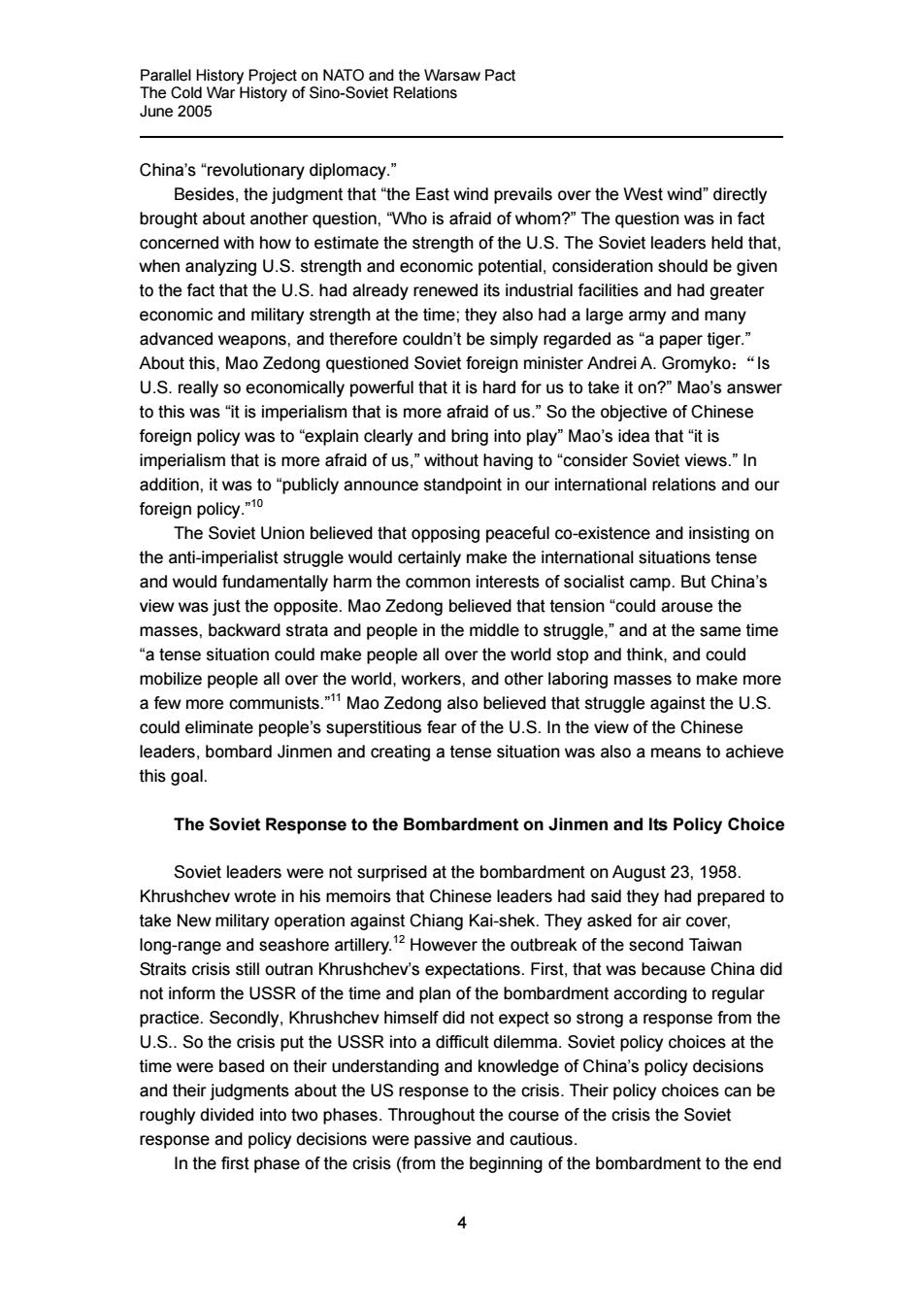正在加载图片...

Parallel History Project on NATO and the Warsaw Pact The Cold War History of Sino-Soviet Relations June 2005 China's "revolutionary diplomacy." Besides,the judgment that"the East wind prevails over the West wind"directly brought about another question,"Who is afraid of whom?"The question was in fact concerned with how to estimate the strength of the U.S.The Soviet leaders held that, when analyzing U.S.strength and economic potential,consideration should be given to the fact that the U.S.had already renewed its industrial facilities and had greater economic and military strength at the time;they also had a large army and many advanced weapons,and therefore couldn't be simply regarded as"a paper tiger." About this,Mao Zedong questioned Soviet foreign minister Andrei A.Gromyko:"Is U.S.really so economically powerful that it is hard for us to take it on?"Mao's answer to this was"it is imperialism that is more afraid of us."So the objective of Chinese foreign policy was to "explain clearly and bring into play"Mao's idea that"it is imperialism that is more afraid of us,"without having to "consider Soviet views."In addition,it was to "publicly announce standpoint in our international relations and our foreign policy.0 The Soviet Union believed that opposing peaceful co-existence and insisting on the anti-imperialist struggle would certainly make the international situations tense and would fundamentally harm the common interests of socialist camp.But China's view was just the opposite.Mao Zedong believed that tension"could arouse the masses,backward strata and people in the middle to struggle,"and at the same time "a tense situation could make people all over the world stop and think,and could mobilize people all over the world,workers,and other laboring masses to make more a few more communists."11 Mao Zedong also believed that struggle against the U.S. could eliminate people's superstitious fear of the U.S.In the view of the Chinese leaders,bombard Jinmen and creating a tense situation was also a means to achieve this goal. The Soviet Response to the Bombardment on Jinmen and Its Policy Choice Soviet leaders were not surprised at the bombardment on August 23,1958. Khrushchev wrote in his memoirs that Chinese leaders had said they had prepared to take New military operation against Chiang Kai-shek.They asked for air cover, long-range and seashore artillery.12 However the outbreak of the second Taiwan Straits crisis still outran Khrushchev's expectations.First,that was because China did not inform the USSR of the time and plan of the bombardment according to regular practice.Secondly,Khrushchev himself did not expect so strong a response from the U.S..So the crisis put the USSR into a difficult dilemma.Soviet policy choices at the time were based on their understanding and knowledge of China's policy decisions and their judgments about the US response to the crisis.Their policy choices can be roughly divided into two phases.Throughout the course of the crisis the Soviet response and policy decisions were passive and cautious. In the first phase of the crisis(from the beginning of the bombardment to the endParallel History Project on NATO and the Warsaw Pact The Cold War History of Sino-Soviet Relations June 2005 China’s “revolutionary diplomacy.” Besides, the judgment that “the East wind prevails over the West wind” directly brought about another question, “Who is afraid of whom?” The question was in fact concerned with how to estimate the strength of the U.S. The Soviet leaders held that, when analyzing U.S. strength and economic potential, consideration should be given to the fact that the U.S. had already renewed its industrial facilities and had greater economic and military strength at the time; they also had a large army and many advanced weapons, and therefore couldn’t be simply regarded as “a paper tiger.” About this, Mao Zedong questioned Soviet foreign minister Andrei A. Gromyko:“Is U.S. really so economically powerful that it is hard for us to take it on?” Mao’s answer to this was “it is imperialism that is more afraid of us.” So the objective of Chinese foreign policy was to “explain clearly and bring into play” Mao’s idea that “it is imperialism that is more afraid of us,” without having to “consider Soviet views.” In addition, it was to “publicly announce standpoint in our international relations and our foreign policy.”10 The Soviet Union believed that opposing peaceful co-existence and insisting on the anti-imperialist struggle would certainly make the international situations tense and would fundamentally harm the common interests of socialist camp. But China’s view was just the opposite. Mao Zedong believed that tension “could arouse the masses, backward strata and people in the middle to struggle,” and at the same time “a tense situation could make people all over the world stop and think, and could mobilize people all over the world, workers, and other laboring masses to make more a few more communists.”11 Mao Zedong also believed that struggle against the U.S. could eliminate people’s superstitious fear of the U.S. In the view of the Chinese leaders, bombard Jinmen and creating a tense situation was also a means to achieve this goal. The Soviet Response to the Bombardment on Jinmen and Its Policy Choice Soviet leaders were not surprised at the bombardment on August 23, 1958. Khrushchev wrote in his memoirs that Chinese leaders had said they had prepared to take New military operation against Chiang Kai-shek. They asked for air cover, long-range and seashore artillery. 12 However the outbreak of the second Taiwan Straits crisis still outran Khrushchev’s expectations. First, that was because China did not inform the USSR of the time and plan of the bombardment according to regular practice. Secondly, Khrushchev himself did not expect so strong a response from the U.S.. So the crisis put the USSR into a difficult dilemma. Soviet policy choices at the time were based on their understanding and knowledge of China’s policy decisions and their judgments about the US response to the crisis. Their policy choices can be roughly divided into two phases. Throughout the course of the crisis the Soviet response and policy decisions were passive and cautious. In the first phase of the crisis (from the beginning of the bombardment to the end 4